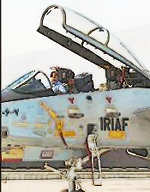 Today’s edition of London’s The Guardian reports on a trial in London of three men accused of shipping military aircraft parts to Iran. These parts are used to maintain its aging fleet of U.S. military aircraft sold by the U.S. to the Shah prior to the revolution. The scheme was uncovered when oxygen cylinders used by fighter pilots to breathe at high altitudes were intercepted at Heathrow with bogus paperwork claiming that the oxygen cylinders were for medical use. According to the prosecution, the three men had engaged in parts trade with Iran well in excess of £1.2 million (or almost US$ 1.8 million)
Today’s edition of London’s The Guardian reports on a trial in London of three men accused of shipping military aircraft parts to Iran. These parts are used to maintain its aging fleet of U.S. military aircraft sold by the U.S. to the Shah prior to the revolution. The scheme was uncovered when oxygen cylinders used by fighter pilots to breathe at high altitudes were intercepted at Heathrow with bogus paperwork claiming that the oxygen cylinders were for medical use. According to the prosecution, the three men had engaged in parts trade with Iran well in excess of £1.2 million (or almost US$ 1.8 million)
According to the article, the three men maintained U.S. business addresses so that they could acquire the aircraft parts from U.S. suppliers without having to obtain export licenses. The parts were then shipped by the trio back to London using misleading and innocent descriptions of the parts in the export documents.
This once again underscores that U.S. suppliers need to exercise caution even with respect to domestic shipments of export-controlled goods. The Iranian supply network is utilizing every available technique to disguise the ultimate destination of the military parts that it acquires, including setting-up front companies and front addresses in the United States, hoping to diminish scrutiny of the transactions in military-related goods. Although no penalty proceedings have yet been instituted against domestic parts suppliers for ignoring red flags that suggest that a domestic sale might in reality be intended for export, that day may not be far off. Sooner or later, a U.S. parts dealer who supplies a Tomcat part to a U.S. customer without any due diligence on the customer or that customer’s need for the product may find itself looking at the same fines as it would have confronted if it had simply shipped the parts directly to Iran.
 Permalink
Permalink
Copyright © 2009 Clif Burns. All Rights Reserved.
(No republication, syndication or use permitted without my consent.)

 Posted by
Posted by  Category:
Category: 

